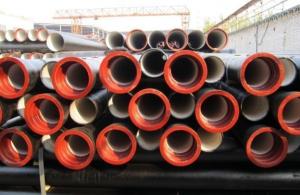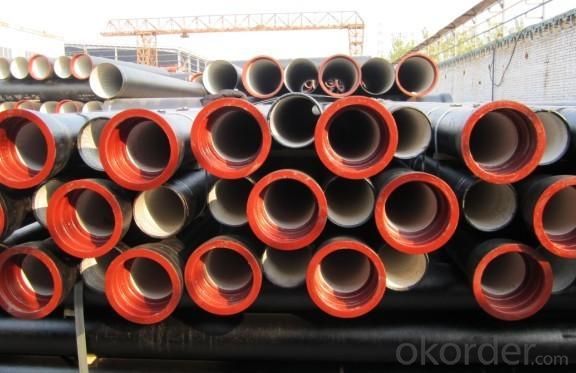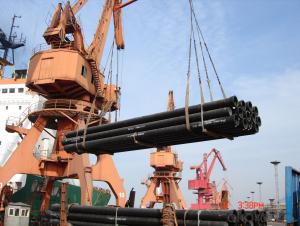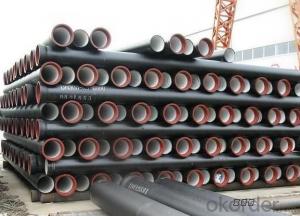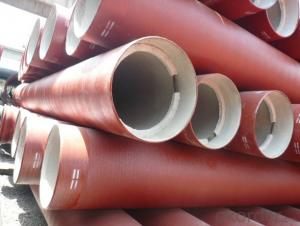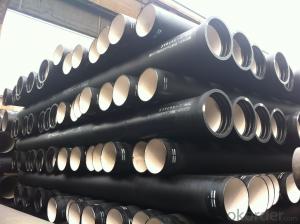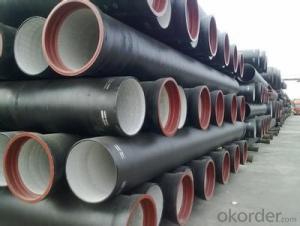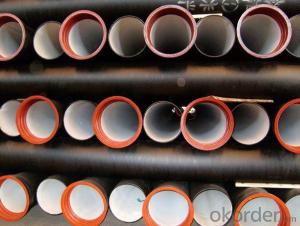Ductile Iron Pipe DN300 EN545 / EN598 / ISO2531
- Loading Port:
- China main port
- Payment Terms:
- TT or LC
- Min Order Qty:
- 20 m.t.
- Supply Capability:
- 200000 m.t./month
OKorder Service Pledge
OKorder Financial Service
You Might Also Like
1.Ductile Iron Pipe Description :
DI pipe fittings are manufactured according to ISO 2531 or BS EN545 or BS4772 FOR POTABLE WATER ,internal is cement lining or wet epoxy coating;External is zinc plus bitumen or wet epoxy coating. We also manufacture ductile iron fittings with fusion bonded epoxy both inside and outside. All the producets are sutible to water pipes fields.
We have passed ISO9001,ISO14001,OHSMS18001 certificate.
2.Main Features of the Ductile Iron Pipe:
•High yield strength
•High tensile Strength
•High corrosion resistance
•Pressure Resistence
•Anti-corrosion
•Installation is convenient
•Satisfy the highest hygienic standards
3.Ductile Iron Pipe Images:
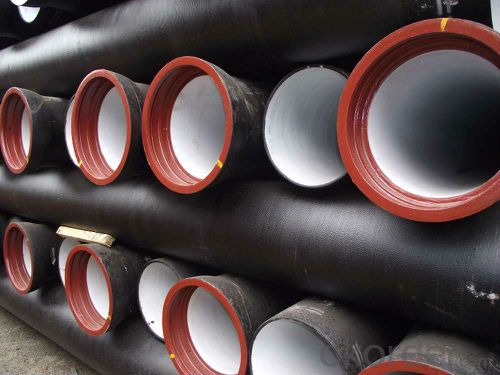
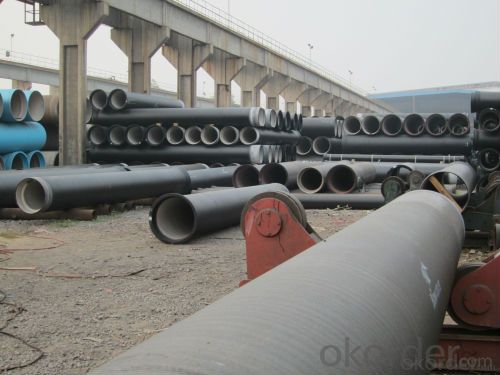
4.Ductile Iron Pipe Specification:
Standard: API SPEC 5L 44th eidtion,ASTM A252-98(2007)
Grade: A53 Grades A/B, ASTM A106 Grades B/C,ASTM A179
AWWA, C200, ASTM A139, ASTM A120, API 5L Grade B
X42, X52, X56, X60, X65, X70, X80, X100
Weld Alternatives: LSAW
OD size range: 6.4~44.5mm
Wall thickness: 406.4~1422mm
Length: 3 - 12 m according to requirment
Note: Other grade can also be provided after consulting. Special design are available for coal slurry conveyance LSAW line tube -- Service
5.FAQ:
We have organized several common questions for our clients,may help you sincerely:
1.Q: Why would you choose ductile iron pipe rather than other pipe materials?
A:The reasons are obvious for that not only ductile iron pipe possesses the inherent strength and flexibility of ductile
iron, combined with proven corrosion protection systems, but also the cost savings can be achieved from design to
installation and commissioning.
2.Q:Why can you guarantee the inner of pipes can’t be corroded?
A: High alumina cement mortar lining and sulphate-resistant cement mortar lining. These two special linings are applicable
to inner anti-corrosion for sewage pipes, improving resistance to erosion of the sewage components.
- Q: What is the average cost of ductile iron pipes?
- The cost of ductile iron pipes can differ based on factors like diameter, length, and location, resulting in varying averages. Typically, the price range for ductile iron pipes is $30 to $100 per linear foot. To illustrate, a 6-inch diameter ductile iron pipe that is 20 feet long could cost approximately $600 to $2,000. It is crucial to understand that these figures are approximations and subject to alteration due to market conditions, project specifications, and supplier pricing. Thus, it is advisable to consult local suppliers or contractors for precise pricing details regarding specific projects.
- Q: Are ductile iron pipes suitable for installation in areas with high groundwater salinity?
- Yes, ductile iron pipes are generally suitable for installation in areas with high groundwater salinity. Ductile iron is known for its corrosion resistance, making it a preferred choice in such environments. However, it is crucial to consider the specific salinity levels and consult with experts to ensure proper pipe coating and protection measures are in place to prevent any potential corrosion or degradation.
- Q: Can ductile iron pipes be used for industrial applications?
- Yes, industrial applications can utilize ductile iron pipes. Ductile iron, a form of cast iron, possesses enhanced mechanical characteristics compared to traditional cast iron. These improvements include increased ductility and strength. Consequently, ductile iron pipes are highly appropriate for industrial applications that require durability, strength, and resistance to external forces. Industrial applications often necessitate the transportation of high-pressure water or fluids. Ductile iron pipes are specifically designed to endure such circumstances. Their exceptional tensile strength enables them to withstand deformation and fractures. This quality renders them optimal for managing heavy loads and enduring significant internal and external pressures. Moreover, ductile iron pipes exhibit exceptional resistance to corrosion, rendering them remarkably suitable for industrial applications that entail exposure to harsh chemicals or corrosive substances. The pipes' resistance to corrosion ensures a prolonged lifespan and decreases maintenance expenses associated with pipe replacements or repairs. Furthermore, ductile iron pipes are renowned for their adaptability and versatility. They can be seamlessly connected and integrated into existing infrastructure, making them the preferred choice for industrial applications. The pipes' impressive strength-to-weight ratio facilitates easy handling and installation, a crucial aspect in industrial settings. In conclusion, ductile iron pipes are well-suited for industrial applications due to their enhanced mechanical properties, corrosion resistance, and versatility. Their ability to endure high pressures, resist deformation, and adapt to existing infrastructure establishes them as an exceptional choice for various industrial applications.
- Q: Can ductile iron pipe be used for irrigation systems?
- Indeed, irrigation systems can utilize ductile iron pipe. Ductile iron proves to be a robust and enduring substance capable of withstanding the demanding conditions of high pressure and continuous water flow necessary for these systems. Its resistance to corrosion renders it appropriate for subterranean applications where it may encounter moisture and soil. Furthermore, ductile iron pipes possess the advantage of being capable of supporting substantial loads, a crucial aspect for irrigation systems potentially relying on heavy machinery or vehicles. In conclusion, ductile iron pipe represents a dependable and enduring option for irrigation systems.
- Q: How do ductile iron pipes handle ground movement in earthquake-prone areas?
- Ductile iron pipes are known for their excellent resistance to ground movement, making them a reliable choice for earthquake-prone areas. These pipes are designed to withstand external forces, including the ground shifting and movement caused by seismic activities. The flexibility of ductile iron pipes allows them to absorb and distribute the energy generated during ground movement. This flexibility is achieved due to the unique composition of ductile iron, which includes nodular graphite in its microstructure. The nodular graphite provides ductility and resilience to the pipe, allowing it to deform under stress without fracturing. When an earthquake occurs and the ground starts to move, ductile iron pipes can adapt to the changing conditions. They have the ability to elongate, compress, and bend, thus reducing the risk of pipe failure. This characteristic is crucial in earthquake-prone areas, as it helps prevent catastrophic failures and water loss that can occur with more rigid pipe materials. Moreover, ductile iron pipes have a high level of joint integrity, which further enhances their ability to handle ground movement during seismic events. The joints of these pipes are designed to withstand lateral and angular movement, ensuring that they remain intact and leak-free. In addition to their inherent flexibility, ductile iron pipes are often installed using techniques that enhance their resistance to ground movement. Anchoring systems, such as thrust blocks and restraints, can be utilized to secure the pipes and prevent excessive movement. These systems help to stabilize the pipeline network and further minimize the potential for damage during earthquakes. Overall, the combination of ductility, joint integrity, and anchoring systems make ductile iron pipes a reliable choice for handling ground movement in earthquake-prone areas. They provide a durable and resilient solution that can withstand the challenges posed by seismic activities, ensuring the continuous supply of water and minimizing the risk of infrastructure damage.
- Q: How are ductile iron pipes transported and stored?
- Ductile iron pipes are typically transported and stored in a systematic and careful manner to ensure their safety and integrity. Transportation of ductile iron pipes usually involves the use of specialized vehicles, such as flatbed trucks or trailers, that are capable of accommodating the size and weight of the pipes. These vehicles are equipped with appropriate securing mechanisms to prevent any movement or damage during transit. The pipes are loaded onto the vehicles using forklifts or cranes, ensuring that they are properly supported and balanced to avoid any bending or deformation. During transportation, it is crucial to protect the pipes from external factors that could potentially cause damage. This includes placing covers or wraps over the pipes to shield them from adverse weather conditions, such as rain, snow, or excessive sunlight. Additionally, securing the pipes with straps or chains can prevent any shifting or rolling during transit. When it comes to storage, ductile iron pipes are typically stacked on specially designed racks or supports in a horizontal position. This allows for even weight distribution and minimizes the risk of deformation or stress on the pipes. The storage area should be clean, dry, and well-ventilated to prevent corrosion or deterioration. It is important to handle ductile iron pipes with care to avoid any impact or rough handling that could result in cracks or fractures. Workers involved in the transportation and storage process should be adequately trained to ensure they follow proper protocols and use the necessary equipment, such as lifting machinery and protective gear. Regular inspection of transported and stored ductile iron pipes is essential to identify any signs of damage or corrosion. This allows for timely repairs or replacements, preventing any potential issues when the pipes are installed for their intended use. Overall, the transportation and storage of ductile iron pipes require careful planning, proper equipment, and adherence to safety protocols to ensure their condition and performance are maintained.
- Q: How is ductile iron pipe tested for quality?
- Extensive quality testing is carried out on ductile iron pipe to ensure its performance and reliability in various applications. The pipe undergoes a series of steps to assess its physical and mechanical properties. The hydrostatic pressure test is one of the main tests performed on ductile iron pipe. This test involves subjecting the pipe to fluid pressure that exceeds its designed operating pressure. The purpose is to determine if the pipe can withstand internal pressure without any leakage or failure. The pipe is filled with water or another suitable fluid, and the pressure is gradually increased to the required level. During this test, the pipe is carefully inspected for any signs of leakage or deformation. Another essential test is the tensile strength test, which measures the pipe's ability to resist pulling or stretching forces. A sample of the pipe is pulled until it breaks, and the maximum force applied during the test is recorded. This test helps determine important properties such as the pipe's ultimate tensile strength, yield strength, and elongation. The Charpy test is used to assess the pipe's impact resistance. In this test, a notched sample is struck with a swinging pendulum to measure the amount of energy absorbed by the pipe. It helps determine if the pipe can withstand sudden impacts or loads without fracturing. In addition to these tests, the pipe also undergoes various non-destructive tests, including ultrasonic testing, magnetic particle inspection, and visual inspection. These tests are crucial in detecting any internal or external defects, cracks, or abnormalities that could compromise the pipe's structural integrity. Furthermore, chemical analysis and metallographic examination are performed to evaluate the chemical composition and microstructure of the ductile iron pipe. These tests ensure that the pipe meets the necessary specifications and standards for its intended application. Overall, the testing process for ductile iron pipe is thorough and stringent. Its purpose is to guarantee the pipe's quality, durability, and overall performance in safely and efficiently delivering water, wastewater, or other fluids.
- Q: Can ductile iron pipes be used for rainwater harvesting systems?
- Certainly, rainwater harvesting systems can utilize ductile iron pipes. Renowned for their robustness and resilience, ductile iron pipes prove to be fitting for a range of purposes, including rainwater harvesting. These pipes exhibit exceptional resistance to corrosion and are capable of withstanding considerable pressure, thereby ensuring the efficient conveyance of rainwater from the point of collection to storage tanks or distribution networks. Moreover, their impressively long lifespan diminishes the necessity for frequent replacements, rendering them a cost-effective option for rainwater harvesting systems.
- Q: Can ductile iron pipe be recycled?
- Yes, ductile iron pipe can be recycled. It is a highly recyclable material that can be melted down and reused in the production of new ductile iron products. Recycling ductile iron pipe helps reduce waste and conserves natural resources.
- Q: Are ductile iron pipes resistant to sulfuric acid corrosion?
- Yes, ductile iron pipes are generally resistant to sulfuric acid corrosion due to their corrosion-resistant coatings and high chemical resistance.
Send your message to us
Ductile Iron Pipe DN300 EN545 / EN598 / ISO2531
- Loading Port:
- China main port
- Payment Terms:
- TT or LC
- Min Order Qty:
- 20 m.t.
- Supply Capability:
- 200000 m.t./month
OKorder Service Pledge
OKorder Financial Service
Similar products
Hot products
Hot Searches
Related keywords
